Here They Come…
That Vince Vaughn profile in the current Newsweek doesn’t lie. His performance as a motor-mouthed, totally scheming hound in Wedding Crashers — a very sharp, at times inspired comic romp — is so hilarious at times that it feels off the earth.
I was saying to myself during last night’s press screening, “This is astounding…the great dialogue just keeps blasting away and Vaughn isn’t missing a beat.”
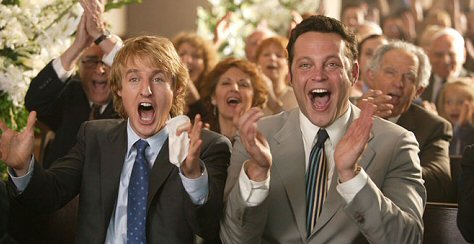
Immaculate deception: Owen Wilson and Vince Vaugh in David Dobkin’s Wedding Crashers
It’s not just Vaughn, of course, but Vaughn and Owen Wilson — also playing a schemer but at the same time the half-soulful counterpoint to Vaughn’s totally sociopathic manipulator — and the banter between them. These guys are a better comic team than Wilson and Ben Stiller. The back-and-forth is fantastic…it’s Martin and Lewis-level.
Vaughn’s comic timing and manic energy make this far and away his best performance since Swingers, and yet he’s so much better here than he was in that 1996 film. It’s Vaughn finding his groove the way Cary Grant kicked into gear when he made The Awful Truth and Bringing Up Baby.
< ?php include ('/home/hollyw9/public_html/wired'); ?>
Vaughn never falters except at the end when the movie makes him go all sappy and sincere. But mostly (and let’s just admit here and now that Crashers doesn’t quite make it all the way around the track) he’s perfect. We’re talking major current here.
Wedding Crashers (New Line, 7.8) stumbles at the close of the second act and doesn’t get its groove back until the very end (it flops around like a goldfish for about 20 minutes), but most of it works. Just because a section of the final act doesn’t play like it should doesn’t mean the first 80% isn’t glorious.
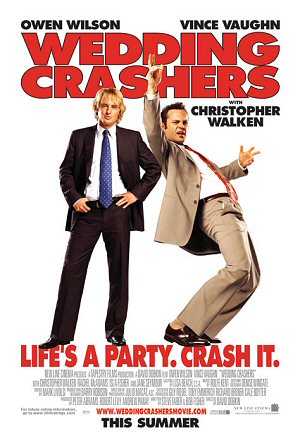
Nobody sings anything in The Wedding Crashers, but the gags and especially the His Girl Friday-on-steroids banter between Vaughn and Wilson is so hilarious and whip-smart that it feels like great music. We’re talking kick-ass dialogue of an exceptionally high order…flip, smarty-pants stuff that doesn’t quit and keeps building and getting funnier.
Plus a reasonably decent stab at romantic sincerity here and there and a very winning, career-making performance by Rachel McAdams.
It’s Vaughn and Wilson (giving the warmest, most fully developed and winning performance of his career…as much of a career-bump thing as his breakout performance in Shanghai Noon was) hitting comic highs that haven’t been felt in a mainstream studio comedy in ages.
It’s the whole concoction — the chemistry between Vaughn and costar Owen Wilson, the wit and attitude in Steve Faber and Bob Fisher’s script (jazzed by Vaughn and Wilson’s on-set improvs), and echoes of not just Meet the Parents but Mike Nichols’ The Graduate.
The Wedding Crashers isn’t as successful as it could be with the sincere emotional stuff, but it does a half-decent job of working with the Graduate scheme of the Three D’s (desire, deception, discovery).
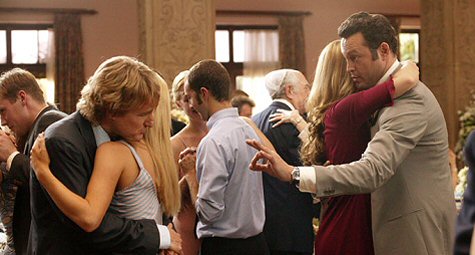
The Graduate is about Benjamin Braddock’s desire for the sultry Mrs. Robinson, the deception he has to throw around to pursue his weeks-long affair with her, and the discovery of true love when he meets and falls for Elaine, her classy and soulful daughter. The last act is about Benjamin’s trying to stop Elaine from marrying a sexist arrogant asshole named Carl.
The Wedding Crashers brings a slightly different order to the formula — discovery preceded by desire preceded by deception.
It’s about a likable deceiver (Wilson’s John Beckwith) — a guy who spends all his time crashing weddings with his pal Jeremy (Vaughn) so he can score with emotionally receptive bridesmaids by lying his ass off about everything…whatever works so he can get in their pants.
Emotions thicken when he falls for a very classy and soulful girl (McAdam’s Claire Cleary), a daughter of a powerful man (like Elaine’s attorney dad was). The discovery comes when he realizes he’s in love and absolutely has to prevent her from marrying an arrogant asshole named Sack (Bradley Cooper, who bears a resemblance to Brian Avery, the actor who played “Carl” 38 or 39 years ago).
I don’t want to make too much of the Graduate analogies, but they do exist and The Wedding Crashers is at least trying to fuse sincere emotionality with rollicking humor. Call me an easy lay, but the fact that it’s not too bad during the heartfelt portion (the last 20 minutes or so) strikes me as acceptable.
The bottom line is that most of this film sails above the clouds. I realize the R rating is going to restrict business among kids in the hinterlands, and it may be too hip for the room in the red-state areas and especially among those who thought Meet the Fockers was the schizzle.
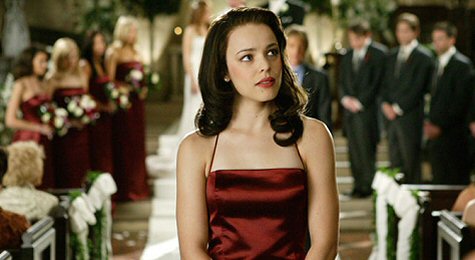
Rachel McAdams, giving the most winning and emotionally grounded performance in a romantic comedy in a long time.
The Wedding Crashers is so much sharper and scalpel-ish than Fockers, they’re not even in the same ballpark. I think it’s funnier and a lot hipper than Meet the Parents even.
There’s only one seriously “off” element, and this is elaborated upon in a transcript of a back and forth I had last night with a guy (see below).
This is a great, great guy comedy…it accepts and celebrates the fact that 95% of the time the only way to get rolling with a woman is to give a sincerely tender, bullshit-stuffed performance. And the first two-thirds (or three-quarters or whatever) take you on a ride with a couple of serious pros who know all the ropes and the angles and still get thrown for a loop and are made to suffer for their sins.
And it’s 80% pure pleasure.
Debate
A guy named “Erasmus” wrote last night to say he’d recently seen Wedding Crashers at a screening held by Creative magazine, and that he thinks it may be getting mixed word-of-mouth because of the ending.
“Not true,” I answered him. “This movie really sails for the first two thirds. I was howling. I was in fucking heaven. It loses its way when the guys get busted, yes, but it gets it back at the very end. And those first three-quarters are incandescent.”
And here’s how it went from there….
Erasmus: To be fair the first two acts which would roughly be the first one hour and ten minutes work reasonably well.
Wells: Not “reasonably well”….inspired. When this movie is in the groove it is in the damn groove and three or four times funnier than Meet the Parents when it is. I’m not exaggerating my feelings. It is awesomely funny at times.
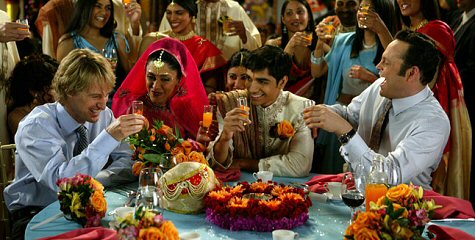
Erasmus: In a Hollywood genre-go-lucky way.
Wells: I really think you’re missing it. I think it’s brilliant, wonderful, ecstasy-time during those first two acts.
Erasmus: But the third act falls apart and everyone knows it’s how the audience feels as they walk out of the movie that matters.
Wells: The third act is bit of a fumble, yes. The movie loses the heat when the guys are busted and sent packing. But the end of it works pretty well. It’s not inspired but it’s pretty good. It touches the bottom of the pool.
Erasmus: And then there’s that big-name supporting cameo that totally kills the movie.
Wells: [Name]’s appearance is not a good thing for this film…you’re right. He’s not funny. He’s actually a drag. He’s actually tedious. He’s a monkey wrench…a chemistry killer.
Erasmus: In fact, some people will say, why is this guy is every comedy all the time? They did not need him.
Wells: Correct.
Erasmus: Any other actor but this guy would have been fine.
Wells: Agreed.
Erasmus: And so in a summer filled with many movies with serious third-act problems — War of the Worlds, Bewitched, Mr. and Mrs. Smith — another has been added to the list.
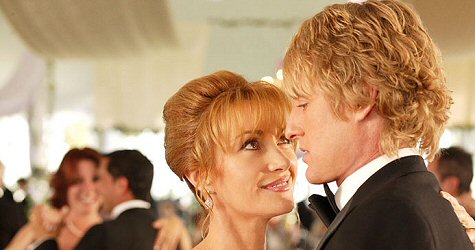
Jane Seymour, Owen Wilson
Wells: You’re not wholly wrong, but the third-act problems are not fatal. They just wound it somewhat.
Erasmus: This movie will still be a hit, despite the stock characters.
Wells: Isla Fisher’s character — the little redhead Vaughn hooks up with — brings a certain freshness to the piece. Rachel McAdam’s character is on the stocky side, fine, but she’s such a good actress she makes her character feel more believable than she’s actually written. Walken is a bit more supple and less obsessive in his father-of-the-bride role than De Niro was.
Erasmus: And a Jane Seymour development that is
started and then dropped right this.
Wells: Why did they do that? Drop her, I mean.
Erasmus: The first two-thirds work. But they had a chance for Meet the Parents-like numbers of $160 million but will get, at the maximum, $80 million.
Wells: I don’t think so. This thing sails so well during the first two thirds, it will be as big as Parents….I think.
Clone Wars
To cover their bases, critics planning to review Michael Bay’s The Island (DreamWorks, 7.22) should probably take a gander at a 1979 low-budget sci-fi flick called Clonus, which came out on DVD last March.
I won’t be seeing The Island until this weekend (it’s sneaking Saturday night) and I haven’t seen Clonus (a.k.a., Parts: The Clonus Horror), but I know they’re both paranoid thrillers about people being cloned by some super-secret government agency.
It’s being widely alleged by a lot of geeks out there (as well as the “movie connections” references for both films on the IMDB) that The Island is a remake of Clonus.

Scarlett Johansson, Ewan McGregor in The Island
Here’s a link to one of the many websites making this claim.
The general view seems to be that the makers of the 26 year-old Clonus — director Robert S. Fiveson, screenwriters Bob Sullivan and Ron Smith — should have received credit or compensation or something.
If the remake allegations have merit (I say “if”), the Island producers and the DreamWorks attorneys probably compared the 1979 film to their about-to-be-filmed screenplay and calculated there was no way the Clonus team could come after them legally.
Clonus, which has apparently been shown on the Sci-Fi Channel and Mystery Science Theater 3000, is about a character named Richard, a resident of some kind of remote micro-managed outpost. Like all the inhabitants of this carefully controlled environment, Richard hopes to be chosen to be sent to a country where everything is ultra-cool and civilized, or something like that.
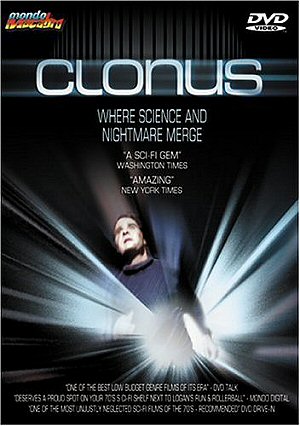
He eventually discovers that everything about his existence is bogus. He and all of his friends are actually clones whose basic purpose is to provide spare parts for their organic human counterparts. Knowing it’s only a matter of time before this happens, Richard and a fellow clone named Lena attempt an escape to an outside world, blah blah.
The IMDB’s synopsis for The Island reads as follows: “A man (McGregor) goes on the run after he discovers that he is actually a ‘harvested being’ and is being kept along with others in a utopian facility.”
For what it’s worth, if you do a Google search for ‘Clonus’ and ‘The Island’ you’ll get thousands of hits commenting on the similarities.
There’s a difference of opinion about whether Clonus is a moderately worthy little sci-fier or a grade-Z enterprise that sucks eggs. Reader opinions will be considered and possibly posted.
Considering
At the beginning of my so-called journalistic career some 26 years ago, I came up with an idea for a magazine called Nothing.
It was supposed to be a half-serious, half-satiric look at celebrities and media matters and movie culture, etc. It seemed to me back then that the tendency of magazines and newspapers to cover the especially puerile and shallow aspects of entertainment culture was getting more and more pronounced.
I figured it might work if a magazine came out that pretended to play this game along with everyone else but was actually satirizing it on some level. Maybe the idea was a little ahead of its time, but it doesn’t seem to be that now with David Spade planning to host a Comedy Central show that lampoons celebrity and movie coverage on shows like Extra and Access Hollywood.
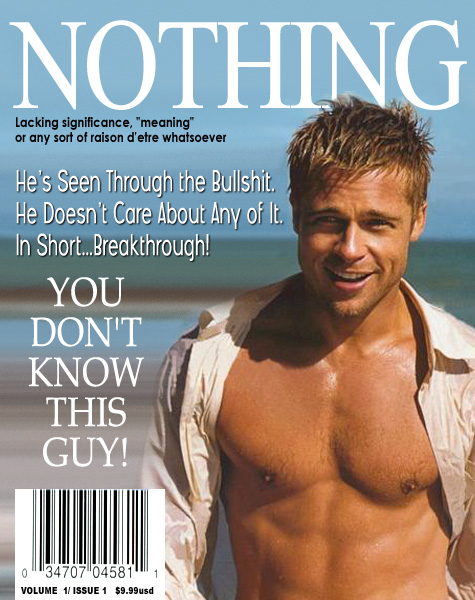
The idea wouldn’t be to suggest that the people profiled or subjects covered in Nothing are empty in and of themselves, but that everything is seeming more accelerated and vacant, and less and less deserving of even our passing attention.
Nothing is all we have, all we’re left with in the end.
It could be kind of a two-tiered thing, actually — satirical as well as existential commentary. I don’t mean to draw a specific reference, but I guess I was half-thinking about Jean Paul Sartre’s Being and Nothingness when I thought up the name.
The magazine wouldn’t so much as cast a glance in Sartre’s direction, of course. It would be aimed, I suppose, at the readers of…I don’t know, Radar or Giant…the usual under-40 males with a sense of humor who’ve had a brush with higher education.
I just know that the culture is about as far away from matters of real substance as it’s ever been, and seems to more and more into pointless diversion. And we need more magazines…well, not exactly deploring this but at least pointing it out in some appropriately dry fashion.
This test cover (thrown together by the intrepid Michael R. Felsher, author of the new HE column “Cinema Obscura”) is what it could look like…maybe. I’ve always imagined something a little dryer, a bit more like Harper’s or The Atlantic.

Another idea I came up with 25 years ago is a regular column called “Hollywood Weltschmerz: The Celebrity in Pain.”
Every damn article about every celebrity is always about how great their life is…how productive, creative, exciting, challenging, etc. I’m not imagining a column that would seek to portray celebrities as gloom-heads but something that would attempt to portray hard-driving filmmaking types in mock-bleak terms…kind of like what Art Linson goes for in his books about producing.
Webster’s Online defines “weltschmerz” as “sadness over the evils of the world…an expression of romantic pessimism.”
New Guys
Here are logo headers for some of the new columns that have been going up. Some of the columnists are just getting going and probably won’t hit their stride for a few weeks yet, but when you get a chance….









